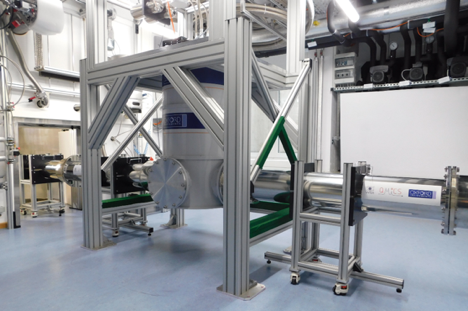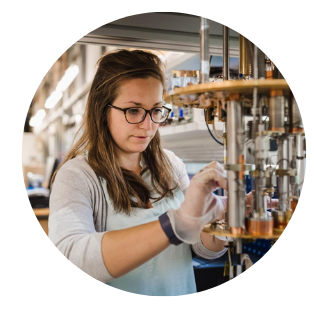Applications
 Part of the Oxford Instruments Group
Part of the Oxford Instruments Group
Expand
Collapse
It’s been an eventful month of March at Oxford Instruments NanoScience and we therefore wanted to share a recap of our most important developments and highlights in our third blog post — from product news to presentations and all important customer insights. Starting with the announcement of ProteoxLX, to our involvement in the APS Physics March Meeting and first ever Quantum Business Europe event, here’s what we’ve gotten up to over the past month.

Firstly, we’re excited to have introduced ProteoxLX, our latest innovation in Cryofree® dilution refrigerator technology for quantum computing scale-up. Optimised for quantum computing, the ProteoxLX is part of Oxford Instruments family of next generation dilution refrigerators which share the same modular layout to provide cross-compatibility and added flexibility for cryogenic installations.
The LX system can maximise qubit counts with its large sample space and ample coaxial wiring capacity, making use of two of the fully customisable Secondary Insert modules to fully integrate signal conditioning components.
You can find out more and download the brochure here.
At the APS Physics March 2021 Meeting we gave a handful of workshop sessions: Proteox Overview and Platform Roadmap and Experimental Applications Using Teslatron PT. In the Proteox overview which I presented, I also discussed some of our quantum partnerships and the work we’ve done on Quantum Microwaves for Communication and Sensing (QMiCS). This is one of 20 projects which got funded in the first call of the European Quantum Technology Flagship Program. I was able to share an update and images from the 6.6 m cryogenic link where a Cryogenic Network Node (CNN) between dilution refrigerators provide future connections to other dilution fridgerators.
The main task of QMiCS is to explore the potential of non-classical propagating microwaves, whose behavior is controlled by the laws of quantum mechanics, for future applications and commercial exploitation. As a part of QMiCS, at Oxford Instruments we developed the cryogenic hardware for a six-meter-long quantum LAN cable connecting two cryostats at low temperatures. If you attended APS but missed my talk, it is still available on the conference virtual platform.

In addition, we also took part in Quantum Business Europe’s (QBE) 2021 virtual event with a presentation on Enabling Technologies for Next-Generation Quantum Computers. This talk is also still available on the conference platform if you missed it! This month we are also sponsoring Physics World's CERN Quantum Technology Initiative webinar. This last talk is being given by Alberto Di Meglio. In the presentation di Meglio is going to introduce the new CERN Quantum Technology Initiative, an overview of the Laboratory’s R&D activities and plans in this field, and he will also provide examples of the potential impact of the research.
During these events we were able to catch-up with customers to get their feedback on the ProteoxLX. The comments we received were really positive from the ability to configure wiring off-line, freeing users up to focus on the experiment itself rather than spending time on configuring the experiment to the added benefit of the system enabling multiple users. Positive feedback also included the fact that with the ProteoxLX system you can have two Secondary Inserts, which means you can be doing multiple experiments at a time, allowing more flexibility.
Our previous blog posts focused on exploring the work of our customers Connor Shelly and Brian Vlastakis, Senior Quantum Engineers at Oxford Quantum Circuits (OQC); and Professor Martin Weides FInstP who holds a Chair in Quantum Technologies at the James Watt School of Engineering, University of Glasgow (UK) as well as Postdoctoral Research Associates, Paul Baity and Sergey Danilin.
Based on our conversations with them we published two Q&As that help uncover how they view quantum and the work they’re currently carrying out with our solutions. We also asked them a very important question: how do you see quantum computing developing in the future? Here’s what they said:
- Oxford Quantum Circuits: “It’s likely that significant uptake beyond discovery or testing will come from early adopters in the financial sector, pharmaceutical industry, material sciences, AI, and security applications (cryptography, defense, etc). At this stage of quantum computing, those early adopters still have to adapt their problems to the limitations and configuration of the hardware available. Co-development between hardware companies and customers will lead to a large number of custom quantum computing platforms purpose-built for particular - and hopefully practical - applications. Ultimately, as quantum processors are scaled up, the use of quantum computing will permeate into every domain in which a quantum advantage can be realised.”
- University of Glasgow: “We think quantum computing is still in its infancy. The problem of building a general-use quantum computer is extremely challenging, and there is a long way to go for this goal. The fundamental physical principles of quantum computation and the operation of the elementary elements involved are already studied very well by academic research groups with many seminal and conceptual results achieved over the last twenty years. Nowadays the quantum computation community faces engineering problems in the structure of packaging/architecture, the interconnectivity of elements, and the control and readout from scaling. As a result, the future brings more engineering and programming challenges that require wider collaboration and participation of industrial parties. We believe that active collaboration between academic research and industry is beneficial for both.”

OQC’s ambition is to lead the industry on Quantum Computing as a Service, enabling our customers to make breakthroughs discoveries, solving some of the world’s most challenging problems. https://oqc.tech/

Visit their website : https://www.gla.ac.uk/
Follow them on LinkedIn : https://www.linkedin.com/schoo...

Harriet van der Vliet